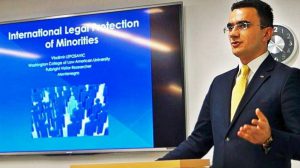
Vladimir Leposavic, 2014-2015, Montenegro, giving a presentation at the Institute of International Education Washington, DC office
In 2014, I was selected to spend an academic year as a Fulbright Foreign Student Visiting Researcher, representing Montenegro, in the United States. My basic goal was to conduct research in international human rights; more specifically, on the international legal protection of minorities at the American University Washington College of Law (WCL). Moreover, I also had an opportunity to participate in a pre-academic summer program at the University of Kansas; consequently, my Fulbright experience started early in summer 2014.
As a PhD candidate at the Belgrade University, I had already been working on topics such as the international legal protection of national and ethnic minorities which is, in spite of its European origins, also a global phenomenon as well as a political and legal issue. Millions of people are living outside of their home countries or in so-called kin-states. The start of the Second World War was justified by the need for protecting one minority, but ended in the horrific extermination of another. In today’s world, more than five-thousand national or ethnic groups live in just about 150 states. In addition, some social experiments show that, even in situation of random grouping, more than 75% of group members tend to engage in different types of discriminatory behaviors toward others. These facts illustrate the social and scientific need for dealing with the subject of inter-group relations and minority protection.
